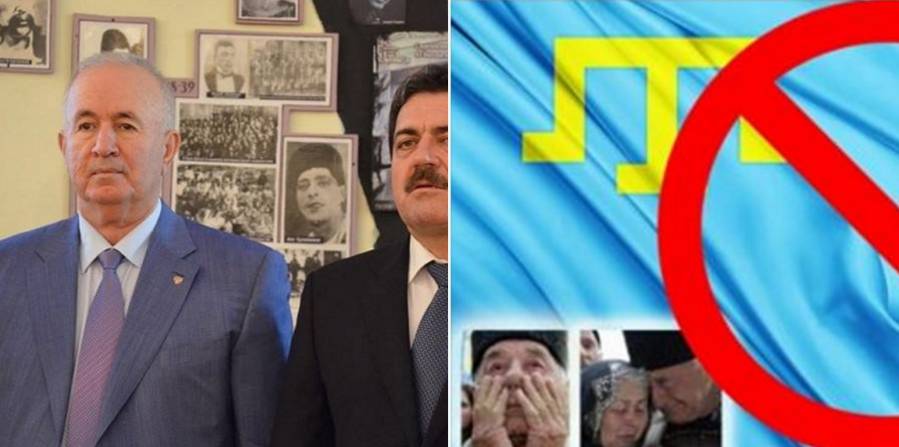Russia uses collaborators at UN to deny its repression of Crimean Tatars
 Instead of returning Crimea or at least putting an end to grave human rights violations on the Ukrainian peninsula, Russia is pulling out (or even creating) marginal groups for use in stunts like the latest appeal by a marginal Crimean Tatar organization to the UN to recognize Crimea as Russian and lift sanctions
Instead of returning Crimea or at least putting an end to grave human rights violations on the Ukrainian peninsula, Russia is pulling out (or even creating) marginal groups for use in stunts like the latest appeal by a marginal Crimean Tatar organization to the UN to recognize Crimea as Russian and lift sanctions
Russia’s representative to the UN has produced a statement, purportedly from the Qırım Birligi organization, headed by Remzi Ilyasov, calling for recognition of Crimea as Russian, an end to sanctions and to the blockade of Crimea which Russia invaded and annexed in early 2014. The appeal from a small pro-Kremlin group comes two months after the UN General Assembly adopted a hard-hitting resolution on the human rights situation in Crimea. This was the first time that Russia’s actions in Crimea were clearly named and condemned as occupation. The Resolution was also important in identifying the grave rights violations under Russian occupation and demands the release of all unlawfully held Ukrainian citizens.
The letter from a few collaborating Crimean Tatars comes just days after the announcement that a newspaper in the Ukrainian language is to be published in occupied Crimea. In that case also, the supposed ‘Ukrainian community’ cited as ‘supporting’ and presumably publishing the newspaper is known for its anti-Kyiv position and was seemingly artificially created by the occupation regime in 2016.
It was also reported on Feb 8 that Russia’s culture ministry has approved the idea of a monument to what is called “the reunification of Crimea with Russia”. This creation is supposed to be of “a Russian, a Ukrainian and a Crimean Tatar holding a book”.
The cynicism of such inept attempts to claim representation from the very ethnic groups facing most repression in occupied Crimea is particularly evident from the photo chosen by the government-controlled TASS news agency as illustration for the report on the letter to the UN. The Reuter photo was presumably chosen for the Crimean Tatar faces and symbols, but are of the demonstration on Feb 26, 2014 called by the Crimean Tatar Mejlis, or representative assembly to prevent pro-Russian politicians from faking a vote to change Crimea’s status. It was after the Mejlis’s call was heeded and the demonstration prevented the ‘vote’ that Russia used soldiers to seize control.
Since then, doubtless in revenge for the Mejlis’ firm opposition to Russian occupation, there has been increasing repression against Crimean Tatars generally, but also the Mejlis and its members. Although the demonstration took place on Ukrainian territory and well before the formal annexation, Russia has held the Deputy Head of the Mejlis in detention for two years and is trying him and some other Crimean Tatars on surreal charges of ‘organizing / taking part in a mass riot’. Akhtem Chiygoz, the Deputy Head, was targeted only because Russia had earlier banned the Head Refat Chubarov, as well as veteran Crimean Tatar leader Mustafa Dzhemiliev from entering their homeland. The Mejlis itself – the self-governing body which represents the vast majority of the Crimean Tatar people – has now been labelled ‘extremist’ and banned, and it is only a question of time before Russia embarks on new arrests of Mejlis leaders.
Instead of releasing political prisoners and reinstating the fundamental rights which have been eroded since its invasion, it is resorting to propaganda methods such as the Qırım Birligi appeal and the accounts that TASS is promising in ‘a special project’ telling how the lives of national minorities have changed after the so-called ‘reunification’.
The letter handed to the UN by Vitaly Churkin is supposed to be from the organization itself, yet simply repeats all Russia’s claims regarding its occupation of Crimea. It asserts that “a violent coup in Ukraine … placed the freedom, life and safety of the Crimean population in jeopardy”.
No mention is made in this narrative of the Russian soldiers and armed paramilitaries used to seize control. Instead, it is claimed that international law does not establish any prohibition on secession, and that the term annexation is incorrect.
There is absolutely no evidence of any threat to Crimeans’ ‘freedom, life and safety” in February 2014, until Russia’s invasion. This has become part of the narrative repeated by Russian President Vladimir Putin and official Moscow, and now parroted in a letter supposedly penned by members of an extremely marginal Crimean Tatar organization.
It should be noted that Russia’s attempts to present its invasion and annexation as some kind of ‘reunification’ after referendum have also been refuted by the International Criminal Court. The Office of the Prosecutor’s Report published in November 2016 concluded that the situation with Crimea constitutes an international armed conflict between Ukraine and the Russian Federation. This is of crucial importance since it means that the conflict falls under the Rome Statute, and is within the International Criminal Court’s jurisdiction. Russia’s immediate attempt to reject the ICC is of no relevance and would not remove its liability.
A brief account of the main victims of Russian repression in occupied Crimea can be found here: Which Repression in Russian-occupied Crimea is ‘Smart’, Mr Trump?





